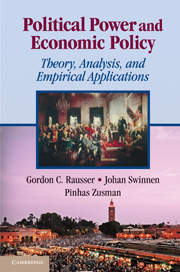Book contents
- Frontmatter
- Contents
- List of Figures
- List of Tables
- Preface
- PART 1 POLITICAL POWER AND ECONOMIC ANALYSIS
- PART 2 IDEOLOGY, PRESCRIPTION, AND POLITICAL POWER COEFFICIENTS
- PART 3 ANALYSIS OF SPECIFIC STRUCTURES
- 10 The Political Economy of Commodity Market Intervention
- 11 The Political Economy of Public Research and Development
- 12 Political-Economic Analysis of Redistributive Policies and Public Good Investments
- 13 Interest Groups, Coalition Breaking, and Productive Policies
- 14 Policy Reform and Compensation
- 15 Political-Economic Analysis of Land Reform
- 16 Political-Economic Analysis of Water Resource Systems
- 17 The Political Economy Lens on Quality and Public Standard Regulations
- 18 Political-Economic Analysis in Transition Economies
- 19 The Power of Bureaucracies: The European Commission and EU Policy Reforms
- PART 4 EMPIRICAL APPLICATIONS OF POLITICAL POWER ESTIMATION
- References
- Index
13 - Interest Groups, Coalition Breaking, and Productive Policies
Published online by Cambridge University Press: 05 June 2012
- Frontmatter
- Contents
- List of Figures
- List of Tables
- Preface
- PART 1 POLITICAL POWER AND ECONOMIC ANALYSIS
- PART 2 IDEOLOGY, PRESCRIPTION, AND POLITICAL POWER COEFFICIENTS
- PART 3 ANALYSIS OF SPECIFIC STRUCTURES
- 10 The Political Economy of Commodity Market Intervention
- 11 The Political Economy of Public Research and Development
- 12 Political-Economic Analysis of Redistributive Policies and Public Good Investments
- 13 Interest Groups, Coalition Breaking, and Productive Policies
- 14 Policy Reform and Compensation
- 15 Political-Economic Analysis of Land Reform
- 16 Political-Economic Analysis of Water Resource Systems
- 17 The Political Economy Lens on Quality and Public Standard Regulations
- 18 Political-Economic Analysis in Transition Economies
- 19 The Power of Bureaucracies: The European Commission and EU Policy Reforms
- PART 4 EMPIRICAL APPLICATIONS OF POLITICAL POWER ESTIMATION
- References
- Index
Summary
Introduction
In the conceptual formulations of Part 2 and the applications in Chapters 10, 11, and 12, the interest group structure is treated as predetermined. Incentives exist, however, for the formation of special interest groups and/or the breaking of interest group coalitions that might be or have been formed. In this chapter, we examine coalition-breaking phenomena presuming that all political power resides with consumers and taxpayers. As in Chapter 12, we shall explicitly specify those productive policies that serve the public interest but may or may not harm some members of special interest groups.
Up to this point, interest groups have been specified as inherently homogenous and with alignment of incentives. In this chapter, we relax this specification and consider empirical instances in which there is heterogeneity among the members of a particular interest group. In essence, as specified in Chapter 3, each individual of a particular interest group evaluates their well-being by remaining within the interest group supporting the current status quo, or by defecting from that interest group and supporting a particular policy reform. As a result, the key to sustaining policy reform is to create incentives through compensation for a sufficient number of potential losers from policy reform to become part of the winning coalition. From an economic perspective, only then is it possible to counter the interest-group landscape to achieve public policies that more adequately serve the public interest.
- Type
- Chapter
- Information
- Political Power and Economic PolicyTheory, Analysis, and Empirical Applications, pp. 239 - 257Publisher: Cambridge University PressPrint publication year: 2011



